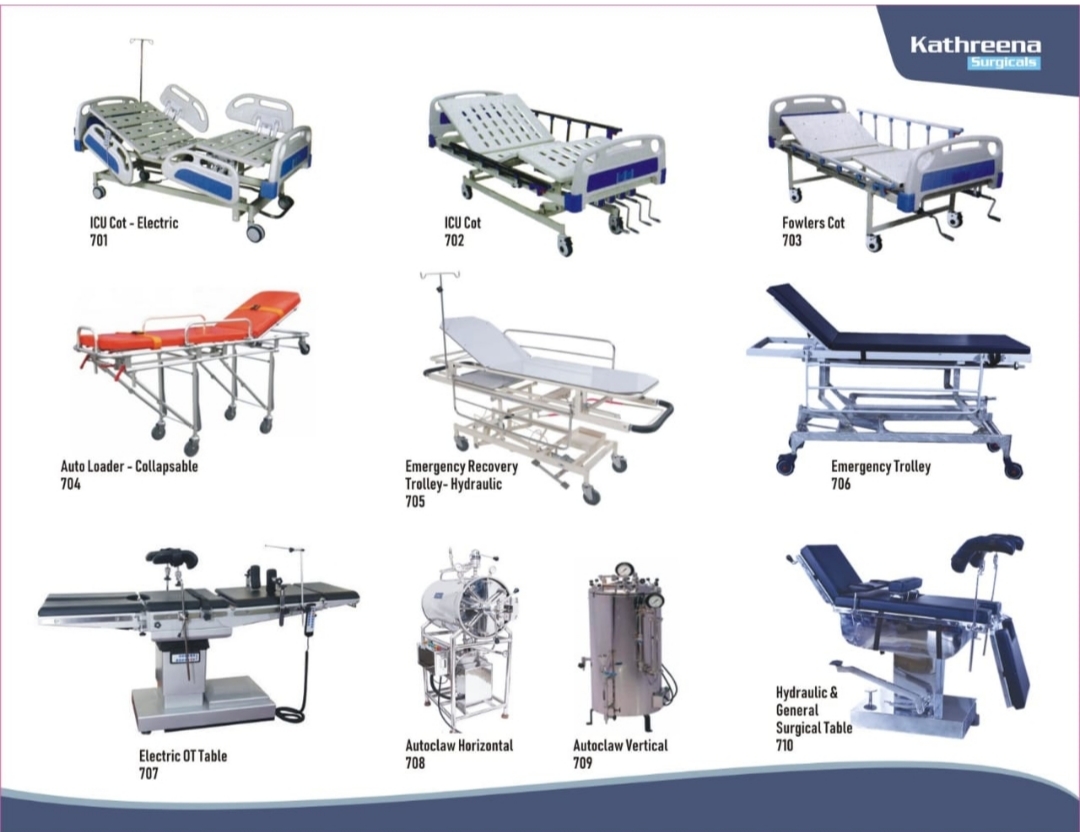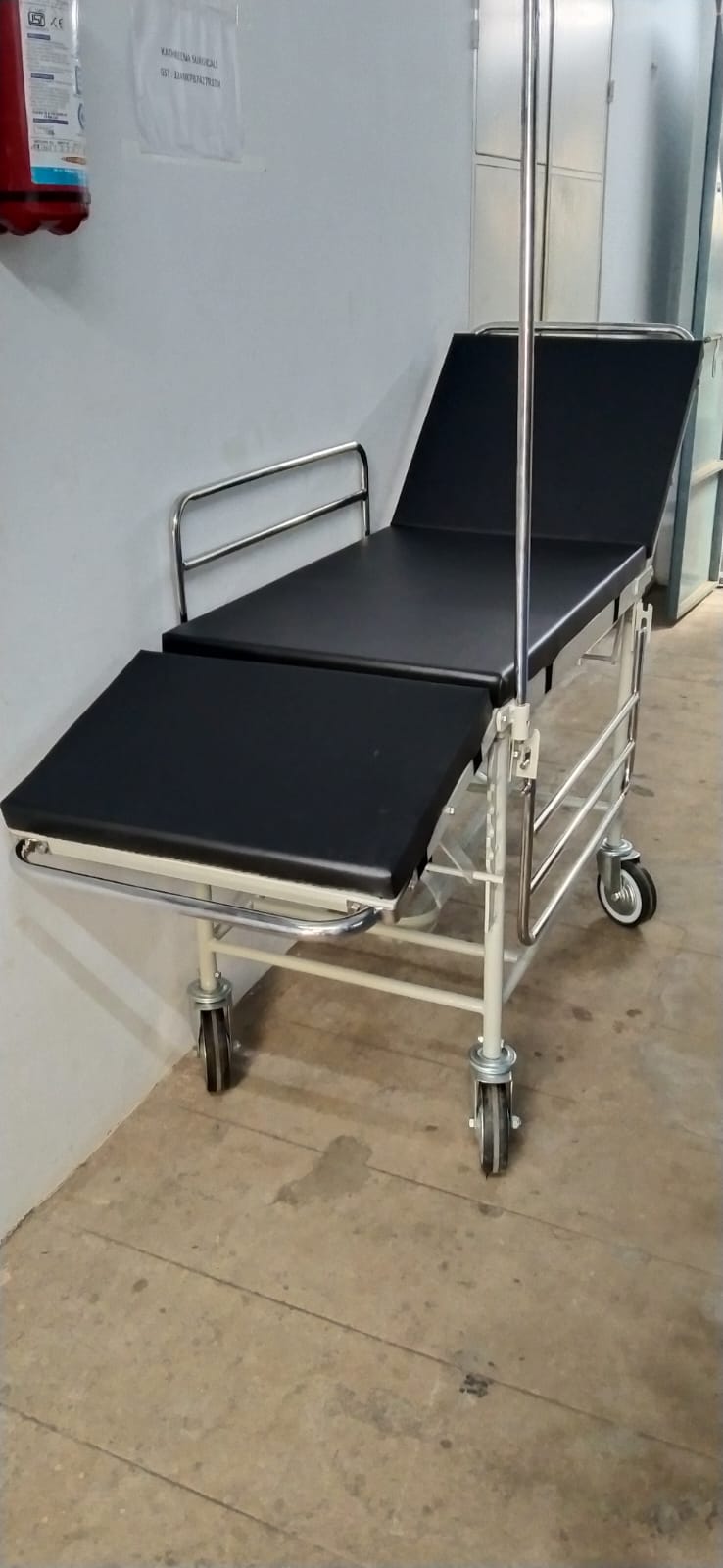Kathreena Surgicals
Palakkad - Kerala
Products & Services:
Kathreena Surgicals, Palakkad, Kerala, Reviews, Contact number, Phone number, Address, Map, Surgical More..
Since : 2004
Palakkad - Kerala
Products & Services:
Kathreena Surgicals, Palakkad, Kerala, Reviews, Contact number, Phone number, Address, Map, Surgical More..
Since : 2004
Sterilizer manufacturing companies are specialized organizations that design, develop, and supply sterilization equipment for hospitals, laboratories, and clinics. These companies produce high-quality sterilizers such as vertical and horizontal autoclaves, ensuring that surgical instruments, laboratory tools, and other medical devices are free from harmful pathogens. In Kerala, sterilizer manufacturing companies provide advanced, durable, and reliable sterilization solutions. Customers expect efficiency, compliance with international safety standards, timely delivery, and responsive after-sales support from these companies.
· Kathreena Surgicals
Mattumanda, Near Mathrubhoomi, Palakkad, Kerala – 678005
· Cochin Sterilisation Pvt. Ltd.
Kochi, Kerala
· Kerala Surgical Co.
Cochin, Kerala
· Krishna Engineering
Thrissur, Kerala
· Delbert Industries
Ernakulam, Kerala
· Jaywin Engineering Services Pvt. Ltd.
Thrissur, Kerala
· Hi Tech Transducers & Devices
Thrissur, Kerala
· Pharma Valid Technologies
Navi Mumbai, Maharashtra
· Aqua Systems Technology
Kochi, Kerala
· Ampersand Systems Pvt. Ltd.
Tripunithura, Kochi, Kerala
Sterilizer Manufacturers are companies that design, produce, and supply sterilization equipment used across healthcare, laboratory, pharmaceutical, and industrial settings. These manufacturers provide devices that eliminate or destroy all forms of microbial life—bacteria, viruses, fungi, and spores—from instruments, equipment, and consumables, ensuring hygiene and safety.
Sterilizer manufacturers produce a variety of sterilizers, including:
Autoclaves (Horizontal and Vertical): Use high-pressure steam for sterilizing surgical instruments, lab glassware, and culture media.
Dry Heat Sterilizers: Employ high temperatures without moisture for materials sensitive to steam.
Chemical Sterilizers: Utilize disinfectants and sterilizing gases for heat-sensitive equipment.
UV Sterilizers and Ozone Sterilizers: Use ultraviolet light or ozone for sterilization in laboratories, pharmacies, and hospitals.
Key aspects of sterilizer manufacturing include:
Quality and Safety: Ensuring equipment complies with ISO, CE, and FDA standards.
Efficiency: Fast sterilization cycles, uniform heat/steam distribution, and energy-saving features.
Durability: Use of corrosion-resistant, high-grade materials like stainless steel.
Automation and Innovation: Advanced controls, digital interfaces, programmable cycles, and remote monitoring.
Sterilizer manufacturers are crucial to healthcare, research, and industrial operations because they maintain sterile environments, prevent infections, and protect patient and staff safety.
Sterilizer manufacturers are crucial contributors to the healthcare and laboratory sectors, providing devices that ensure medical instruments, laboratory equipment, and other critical tools are free from harmful microorganisms. These manufacturers design sterilizers that are reliable, efficient, and compliant with international hygiene standards, supporting hospitals, clinics, laboratories, and pharmaceutical industries. By producing high-quality sterilization equipment, they help prevent infections, protect patients, and maintain a safe environment for medical professionals and researchers. The contribution of sterilizer manufacturers is vital in maintaining the overall quality of healthcare services.
Sterilizer manufacturers play a critical role in healthcare by providing equipment that maintains sterile environments in hospitals, clinics, and laboratories. Their products, including autoclaves, dry heat sterilizers, chemical sterilizers, and UV sterilizers, are essential for eliminating harmful microbes from surgical instruments, lab tools, and medical devices. By producing reliable sterilizers, manufacturers help prevent hospital-acquired infections and ensure patient safety during medical procedures.
The importance of sterilizer manufacturers lies in their adherence to stringent quality standards. Advanced sterilizers are designed with precise temperature, pressure, and cycle controls to guarantee consistent sterilization. Manufacturers use high-grade materials like stainless steel and corrosion-resistant alloys to ensure durability and safety. Compliance with international standards such as ISO, CE marking, and FDA approvals ensures that sterilizers meet global performance and safety benchmarks.
Sterilizer manufacturers serve a worldwide market, supplying hospitals, laboratories, pharmaceutical companies, and research centers. Their products are crucial in both advanced medical facilities and resource-limited regions, enabling consistent hygiene practices across healthcare systems. By providing innovative and efficient sterilization solutions, manufacturers contribute to better surgical outcomes, safer laboratory practices, and overall improvements in public health.
Modern sterilizers come equipped with advanced features to meet the growing demands of hospitals and laboratories. Manufacturers focus on incorporating programmable cycles, digital displays, automatic temperature and pressure control, and safety interlocks to ensure precision and reliability. Many sterilizers are designed with stainless steel chambers, corrosion-resistant surfaces, and user-friendly interfaces, enhancing both durability and ease of operation. Innovation in this field also includes energy-efficient models, faster sterilization cycles, and compatibility with various instruments, making sterilizers more adaptable to different professional settings. These advancements ensure sterilization is thorough, safe, and time-effective.
Modern sterilizers are designed to provide reliable and efficient sterilization for medical, laboratory, and pharmaceutical equipment. They use technologies such as high-pressure steam (autoclaves), dry heat, chemical vapor, and ultraviolet light to eliminate bacteria, viruses, fungi, and spores. Precise temperature, pressure, and cycle controls ensure consistent sterilization while protecting sensitive instruments and materials.
Innovation in sterilizers has brought advanced digital interfaces, programmable cycles, and automated safety mechanisms. Many models feature touchscreen controls, memory functions for recurring sterilization programs, and real-time monitoring of pressure, temperature, and cycle progress. Safety interlocks prevent accidental opening during operation, and alerts notify users of any malfunction. Some advanced sterilizers even offer IoT-based remote monitoring and data logging for compliance and traceability.
Modern sterilizer manufacturers focus on eco-friendly and energy-efficient designs. Features such as optimized steam consumption, faster cycle times, water-saving mechanisms, and reusable sterilization trays reduce operational costs and environmental impact. Durable construction with corrosion-resistant stainless steel ensures longevity, while ergonomic loading and unloading designs improve workflow. By combining efficiency, safety, and sustainability, sterilizers help healthcare and research facilities maintain sterile environments while supporting global best practices.
Sterilizer manufacturers operate on a global scale, supplying hospitals, laboratories, and pharmaceutical companies worldwide. Countries such as India, Germany, the USA, and China are recognized for producing high-quality sterilizers that meet stringent safety and quality standards. With the increasing focus on hygiene, infection control, and patient safety, the demand for sterilizers has grown significantly. Manufacturers offer a variety of models, from compact units for small clinics to large, industrial-grade sterilizers for hospitals and research facilities. Their global presence ensures timely delivery, installation, and maintenance support, helping healthcare institutions maintain uninterrupted sterilization operations.
Sterilizers are indispensable equipment in healthcare, laboratories, and pharmaceutical industries, creating a high demand across the globe. Leading sterilizer manufacturers supply hospitals, research centers, clinics, and industrial facilities worldwide. Through distributors, direct supply agreements, and international dealers, these manufacturers ensure that reliable sterilization equipment is accessible wherever it is needed, supporting safety and hygiene standards globally.
The global availability of sterilizers ensures that various healthcare and laboratory requirements are met. Manufacturers offer a wide range of models—from compact tabletop autoclaves for small clinics to large-capacity sterilizers for hospitals and industrial labs. Modular designs, easy-to-use interfaces, and compliance with international certifications allow facilities in both advanced and resource-limited regions to maintain high standards of sterilization and infection control.
The demand for sterilizers continues to grow due to rising surgical procedures, laboratory research, and pharmaceutical production. Manufacturers are increasingly integrating energy-efficient designs, automation, IoT-based monitoring, and eco-friendly materials to meet global needs. As healthcare infrastructure expands and technological innovations advance, sterilizer manufacturers play a vital role in ensuring that hospitals and laboratories worldwide have reliable, safe, and efficient sterilization solutions.
1. What
is a sterilizer?
A sterilizer is a device used to eliminate bacteria, viruses, and other harmful
microorganisms from medical or laboratory equipment.
2. Why
are sterilizers important in healthcare?
They prevent infections, protect patients, and ensure a safe working
environment for medical professionals.
3. What
types of sterilizers are available?
Common types include autoclaves, dry heat sterilizers, chemical sterilizers,
and UV sterilizers.
4. What
features do modern sterilizers have?
Digital controls, programmable cycles, automatic temperature and pressure
regulation, and safety interlocks.
5. Are
sterilizers energy-efficient?
Yes, many modern models are designed to save energy while maintaining effective
sterilization.
6. Which
countries are leading sterilizer manufacturers?
India, Germany, the USA, and China are major manufacturers of high-quality
sterilizers.
7. How do
manufacturers ensure safety and reliability?
Through stringent testing, compliance with international standards, and
high-quality construction materials.
8. Can
sterilizers handle large loads?
Yes, sterilizers are available in various sizes to accommodate small, medium,
or large capacities.
9. Do
manufacturers provide installation and maintenance services?
Yes, global manufacturers often provide installation, maintenance, and spare
parts support.
10. Where
can hospitals or labs purchase sterilizers?
They can purchase directly from manufacturers or through authorized
distributors worldwide.

Kerala, Palakkad

Kerala, Palakkad
Latest Customer Reviews
"Best Surgical Equipment Dealers in Kerala"